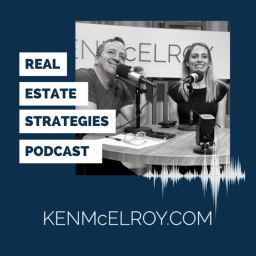
by Buck Joffrey
Financial Education and Entrepreneurship for Professionals
Language
🇺🇲
Publishing Since
9/30/2013
Email Addresses
1 available
Phone Numbers
0 available

April 27, 2025
The last couple of weeks, we’ve been deep in the world of buying businesses. But what happens when it’s time to cash out? Maybe you’re ready to sell your business, that investment property you’ve managed for years, or another major asset you’ve poured your energy into.<br /> <br /> <br /> <br /> If you’re like most people, the thrill of a big sale is quickly followed by a less-exciting thought: “Wait, how much am I going to owe in taxes?” It’s the classic one-two punch—first the celebration, then the sinking feeling as you picture Uncle Sam’s hand reaching for a chunk of your hard-earned gains.<br /> <br /> <br /> <br /> But here’s the good news: you actually have options. Real, legal, IRS-approved options. And the right strategy can mean the difference between watching your profits shrink and putting your money to work for you—sometimes for years to come. Of course, things get a little trickier if you have a mortgage or other debt on the property, but don’t worry—we’ll break that down too.<br /> <br /> <br /> <br /> Let’s start with one of the oldest tricks in the book: the 1031 Exchange. If you own investment real estate, you’ve probably heard about this one. The idea is simple: sell your property, buy another “like-kind” property, and—if you follow the rules—kick that tax bill down the road.<br /> <br /> <br /> <br /> But here’s the twist: if you’ve got a mortgage, you’ll need to replace that debt with equal or greater debt on your next property, or pony up the difference in cash. Otherwise, the IRS will want a piece of the action right away. So yes, leverage matters!<br /> <br /> <br /> <br /> Now, maybe you’re tired of being a landlord but still want those tax perks. Enter the Delaware Statutory Trust, or DST. This is essentially 1031 exchanging into a syndication that is designed for this type of thing. You sell your property and, instead of buying another one yourself, you buy a slice of a big, professionally managed property—like an apartment complex or shopping center. DSTs often come with their own loans, so you can match your old mortgage and keep the tax deferral going. The upside? No more midnight calls about leaky faucets. The downside? You’re trusting someone else to run the show and they need to be good at it (just like any syndication operator). And, there are some rules and restrictions that can affect your returns negatively.<br /> <br /> <br /> <br /> But what if you’re selling a business? That’s where Employee Stock Ownership Plans, or ESOPs, come in. Imagine selling your company to the people who helped you build it—your employees—and deferring a big chunk of your capital gains tax in the process. It’s a win-win, but if your business has debt, things can get complicated fast. This is definitely a strategy where you’ll want a seasoned advisor in your corner.<br /> <br /> <br /> <br /> Now, let’s talk about installment sales and structured sales. In this scenario, instead of getting paid all at once for your asset, you spread out the payments—and the taxes—over several years. Structured sales even bring in a third party to guarantee those payments, adding an extra layer of security. But—and this is a big but—if you have a mortgage, the IRS treats the amount the buyer pays off as if you got that money in cash on day one. So, you’ll pay taxes on that portion right away. For example, if you sell for $1 million but owe $600,000, you can only defer taxes on the $400,000 you actually receive over time. The more debt you have, the less you can defer.<br /> <br /> <br /> <br /> And finally, we have the Deferred Sales Trust—the topic of this week’s Wealth Formula Episode. Think of this as the “supercharged” version of a structured sale. Instead of waiting on the buyer for payments, you transfer your asset to a trust, which sells it and invests the proceeds. You get to choose how and when you receive your money, and the trust can invest in all kinds of assets while your taxes stay deferred. It’s flexible,

April 20, 2025
Industry experts discuss funding strategies for commercial real estate and business acquisitions, highlighting the importance of financial readiness for successful deals.

April 13, 2025
Buck Joffrey explores the benefits and risks of buying an existing business using SBA loans in this episode

The Rich Dad Media Network

Ken McElroy

Real Estate Investing with Keith Weinhold

The Real Estate Guys

Jason Hartman

Hall CPA

The Rich Dad Media Network

Kathy Fettke / RealWealth

Real Estate Investing with Marco Santarelli, Investor and Entrepreneur.

George Gammon

Joe Fairless

Kathy Fettke / RealWealth

BiggerPockets

Rod Khleif

BiggerPockets
Pod Engine is not affiliated with, endorsed by, or officially connected with any of the podcasts displayed on this platform. We operate independently as a podcast discovery and analytics service.
All podcast artwork, thumbnails, and content displayed on this page are the property of their respective owners and are protected by applicable copyright laws. This includes, but is not limited to, podcast cover art, episode artwork, show descriptions, episode titles, transcripts, audio snippets, and any other content originating from the podcast creators or their licensors.
We display this content under fair use principles and/or implied license for the purpose of podcast discovery, information, and commentary. We make no claim of ownership over any podcast content, artwork, or related materials shown on this platform. All trademarks, service marks, and trade names are the property of their respective owners.
While we strive to ensure all content usage is properly authorized, if you are a rights holder and believe your content is being used inappropriately or without proper authorization, please contact us immediately at [email protected] for prompt review and appropriate action, which may include content removal or proper attribution.
By accessing and using this platform, you acknowledge and agree to respect all applicable copyright laws and intellectual property rights of content owners. Any unauthorized reproduction, distribution, or commercial use of the content displayed on this platform is strictly prohibited.
